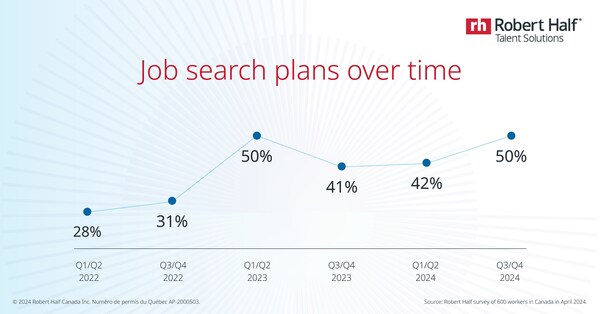
What are the biggest deal breakers?

Canadian professionals seem to have regained their confidence in the hiring market, with more looking for new employment in the second half of the year, according to a recent report.
Overall, 50% have started looking or plan to start looking for a new job in the second half of 2024, reports Robert Half.
That number is up from 41% in the fourth quarter of 2023 and 42% in the first quarter of 2024.

Source: Robert Half
"As the economic outlook has evolved, professionals' optimism in the job market has evolved too", says Koula Vasilopoulos, senior managing director of Robert Half Canada. "Workers are feeling confident in their abilities and in the opportunities available to them, especially for those with in-demand skills and experiences."
Nearly eight in 10 (78%) Canadian professionals, whether actively job seeking or not, say they are confident in their abilities and have taken steps to increase their value and employability by learning new skills.
Over half (55%) of employers worldwide are planning to increase headcount over the next two years due to the rapidly developing technology, according to a previous ManpowerGroup study.
The increased appetite for looking for new employment is true across nearly all age groups, especially among Baby Boomers, according to Robert Half’s survey of 600 workers 18 years and older and more than 200 hiring managers at companies, conducted in April 2024.
|
Generation |
July 2023 |
June 2024 |
|---|---|---|
|
Gen Z |
64% |
69% |
|
Millennials |
49% |
47% |
|
Gen X |
39% |
44% |
|
Baby Boomers |
22% |
40% |
A higher salary (60%) and better benefits and perks (50%) are job seekers’ top two motivations for seeking new employment. Other things that motivate Canadian professionals to find a new job are more flexibility (32%) and a higher-level title (31%).
Hiring managers are advised to be "hyper-vigilant" of cyberthreats following reports of threat actors using fake resumes to gain access to sensitive company information, according to a previous report.
But the job search is not easy for Canadian professionals, according to Robert Half.
The top challenges that they face include:
And while job seekers may find it worth it to go through these troubles to find new employment, there are still a number of deal-breakers for them. These include:
"Even though optimism is high, job seekers continue to face challenges in the labour market, and they need to take a strategic approach to their job hunting,” says Vasilopoulos. “In addition, employers looking to attract top talent should be ensuring that their hiring processes, compensation packages, and perks and benefits are competitive and aligned with what workers are looking for."
With many employers looking to hire more talent, and many professionals seeking new employment, it’s important for companies to have to Toggl Hire.
“80% of employee turnover is due to bad hiring decisions, and replacing an employee can cost 6-9 months of the employee’s salary,” it said via LinkedIn. “Keeping your hiring strategy short and sweet (guided by razor-sharp recruitment goals) can push your candidate experience scores into the 80s and 90s.”
MEI – which stands for merit, excellence, and intelligence – is a new hiring principle that is drawing division amid implications that it's meant to oppose diversity, equity, and inclusion (DEI) strategies in the workplace, according to a previous report.